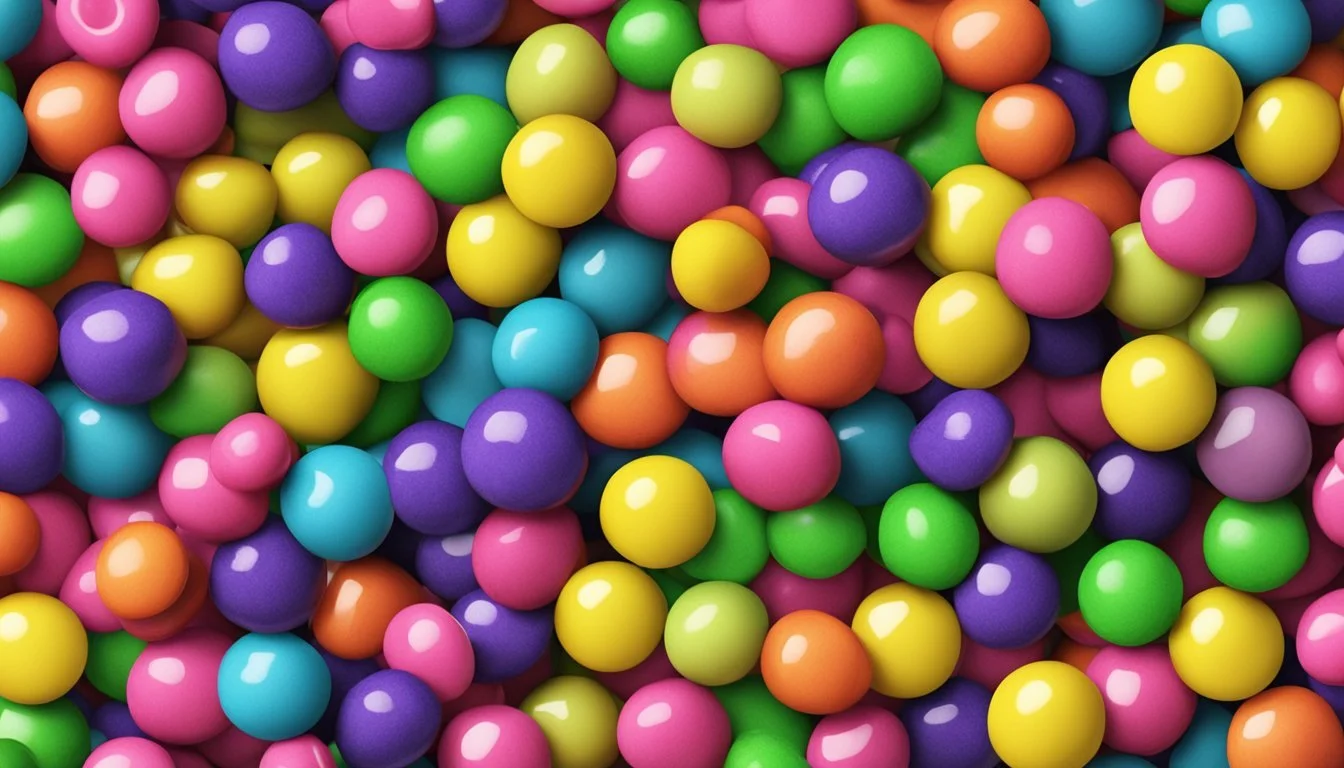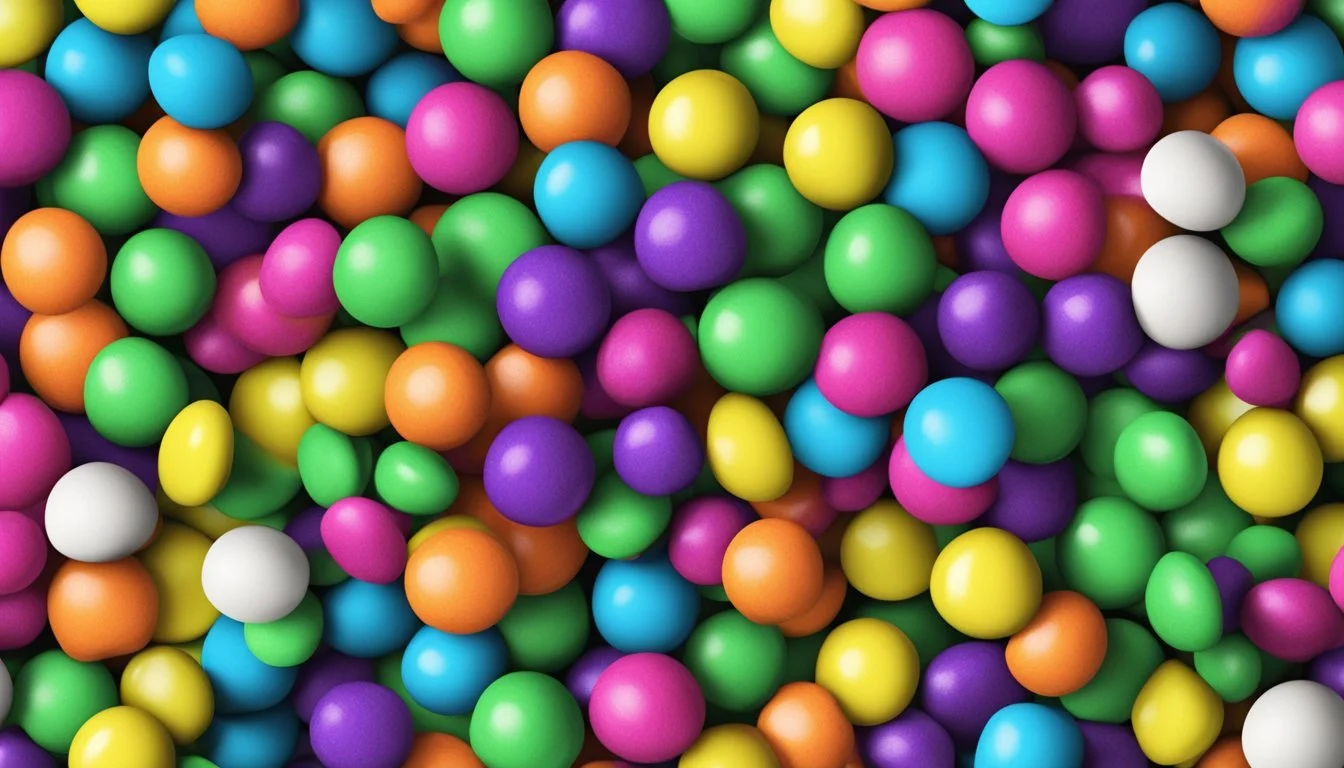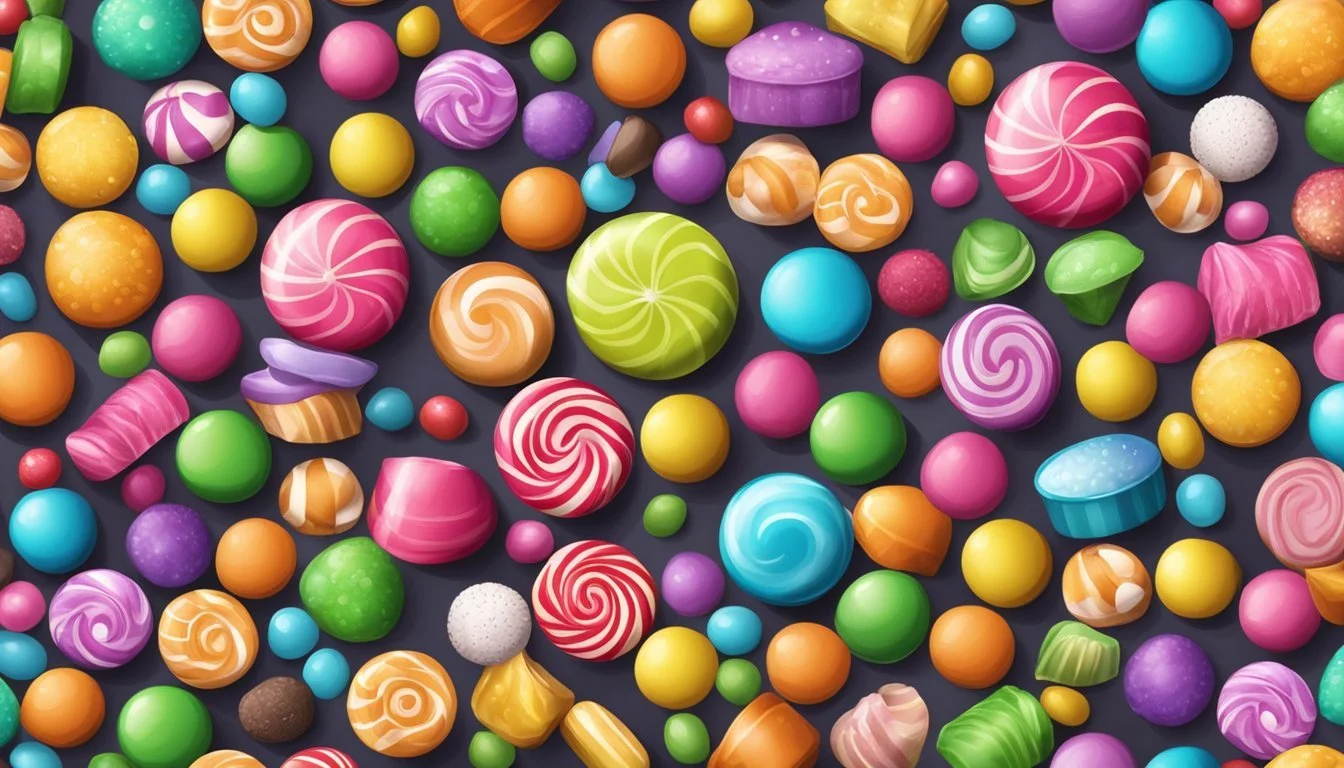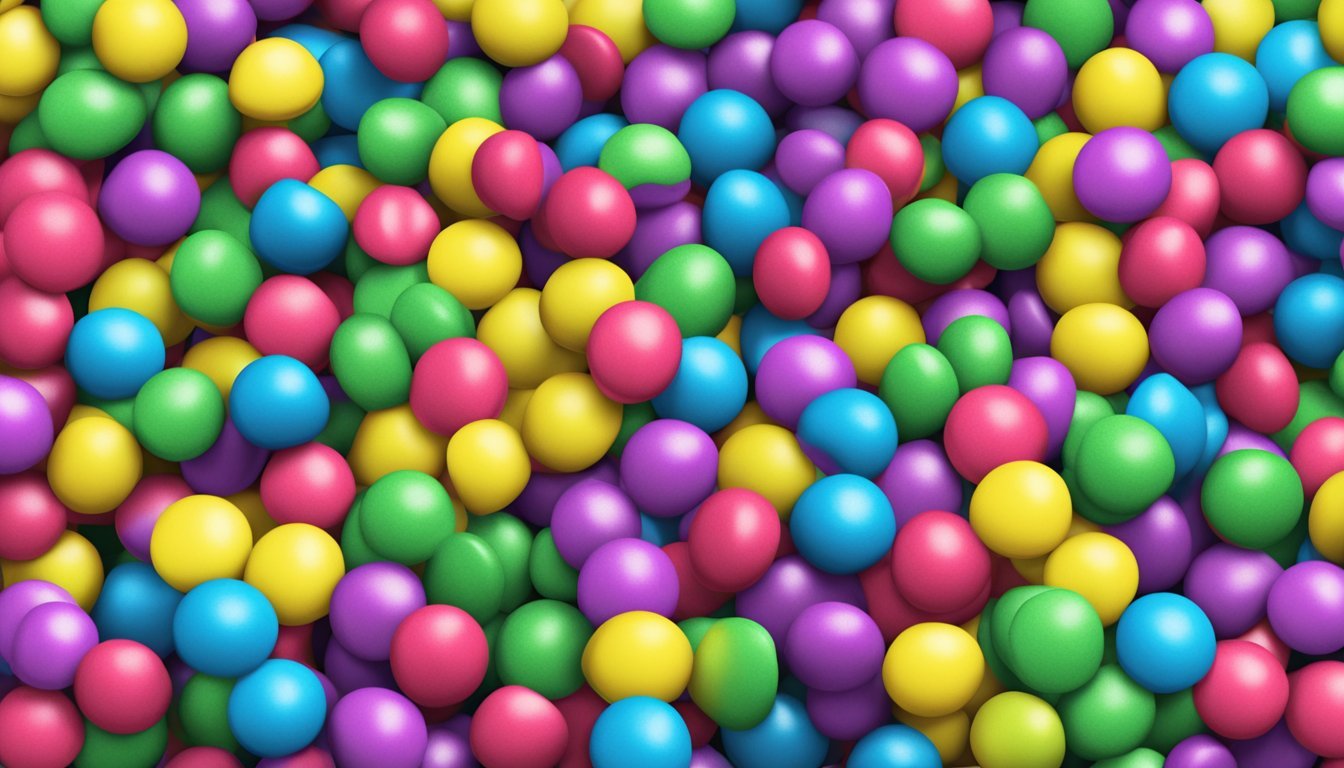Are Gobstoppers Vegan?
Unveiling the Ingredients
When assessing whether Gobstoppers are suitable for a vegan diet, one must consider the ingredients used in their production. Gobstoppers, a popular candy known for its hard texture and layers of flavors, are often scrutinized by those adhering to veganism—a lifestyle that avoids the use of animal products for ethical, health, or environmental reasons.
Analysis of Gobstoppers reveals differing opinions regarding their vegan status. The primary concern lies in the use of certain ingredients such as egg albumen, which is present in some varieties of Gobstoppers. Egg albumen, derived from eggs, disqualifies those Gobstoppers from being considered vegan since it is an animal product. Additionally, some variations also contain calcium stearate, an ingredient that can be sourced from both plant and animal origins, casting further uncertainty on the vegan status of the product.
Consumers interested in plant-based diets need clear information on the ingredients and production processes of such candies to make informed choices. It is important for manufacturers to provide transparency so that those following a vegan lifestyle can determine whether Gobstoppers align with their dietary principles.
What Are Gobstoppers?
Gobstoppers, also known as jawbreakers, are a type of hard candy that is popular for its long-lasting quality and variety of layers. Gobstoppers are typically spherical in shape and are composed of multiple layers that dissolve one after the other, revealing different colors and flavors as they are consumed. The experience of enjoying a Gobstopper involves a progression through these layers, which is part of the appeal for many candy enthusiasts.
These candies are named for their intended quality of being so hard that they could "stop" one's "gob," a playful British slang term for mouth. Each layer of a Gobstopper is essentially a concentrated sugar solution that is supersaturated and allowed to deposit, forming a solid, hard layer. As consumers suck on the candy, saliva gradually dissolves each layer, making it a long-lasting treat.
The flavors of Gobstoppers vary, with some incorporating bold fruit flavors. The appeal of Gobstoppers extends beyond the taste to the anticipation of reaching the center, which sometimes contains a different textured candy, such as a chewy core.
Manufactured by various candy companies, Gobstoppers may come in an array of sizes ranging from small bite-sized pieces to larger varieties meant to last even longer. These treats are often brightly colored and can be found in the candy aisles of many stores, enjoyed by individuals looking for a candy that offers a prolonged and engaging snacking experience.
Veganism and Candies
Vegan diets are characterized by the exclusion of animal products. Individuals who follow veganism do so for various reasons including health, environmental concerns, and ethical stances regarding animal rights. Candies, while often viewed as a universal treat, may pose challenges for vegans due to ingredients that originate from animals.
Ingredients to Avoid:
Gelatin: Derived from animal collagen
Carmine: A red dye made from cochineal insects
Casein: A milk protein
Shellac: A secretion from the lac bug
Many candies available on the market contain these non-vegan components, making them incompatible with a plant-based diet. However, as awareness increases, the demand for vegan candies that adhere to these dietary restrictions has grown.
Vegan-Friendly Options:
Candies made with fruit pectin instead of gelatin
Colorants sourced from plants or minerals
Candies that are labeled vegan are strictly plant-based and refrain from using any animal-derived ingredients, presenting suitable options for both vegans and vegetarians. It's not only about the absence of meat but also dairy, eggs, and any hidden animal byproducts that often find their way into mainstream candy products.
The increase in demand for vegan candy has led to a growing market, with manufacturers introducing a variety of sweets that cater to these dietary preferences. Consumers following a plant-based diet can enjoy these alternatives without compromising their values, as the confectionery industry adapts to the nuanced needs of vegans and vegetarians.
Ingredients in Gobstoppers
This section explores the various ingredients that make up Gobstoppers, with a particular focus on their suitability for a vegan diet.
Core Ingredients
Gobstoppers are primarily composed of sugar and corn syrup, providing the base for their sweet taste. The primary sugars utilised are dextrose and maltodextrin.
Colors and Flavors
These candies include a range of colors such as yellow 5, yellow 6, blue 1, red 40, as well as their lake counterparts: yellow 5 lake, yellow 6 lake, blue 2 lake, and red 40 lake. Both natural and artificial flavors are added to give them their distinctive tastes.
Additional Compounds
To achieve their hard texture and shine, additional compounds such as calcium stearate, which functions as an anti-caking agent, and carnauba wax, used as a coating, are incorporated.
Potential Allergens and Animal Derivatives
Gobstoppers may contain traces of egg albumen, which is a protein derived from eggs. This ingredient is used in many candies to improve texture and is a concern for vegans.
Controversial Ingredients
Artificial colors often raise questions regarding vegan suitability due to the testing on animals. Although not derived from animals directly, this testing can make them non-vegan in the eyes of some. Moreover, there are concerns about other ingredients like carnauba wax and shellac, frequently used in confectionery but can also derive from animal products like insects.
Gobstoppers' Suitability for Vegans
Gobstoppers, also known as jawbreakers, are hard candies with multiple layers. When assessing their suitability for vegans, several ingredients necessitate close examination.
Ingredients of Concern:
Carnauba Wax: This is a plant-based wax derived from the leaves of the carnauba palm and is considered vegan.
Stearic Acid: Commonly found in candy, stearic acid can be derived from both animal and plant sources. In the case of Gobstoppers, it’s crucial to verify the source of the stearic acid to ensure it aligns with vegan standards.
Potential Issues for Vegans:
Some versions of Gobstoppers have included egg albumen in the past, which is not vegan.
Artificial colors and flavors: Although generally vegan, some vegans choose to avoid these due to ethical concerns related to animal testing.
Manufacturing Considerations:
Vegans should be aware of the potential for cross-contamination with non-vegan products during the manufacturing process.
Summary for Vegans:
Vegetarians can consume Gobstoppers as they don't contain meat.
Vegans need to verify the current ingredients list to ensure it aligns with vegan principles, especially concerning the source of stearic acid, and consider their stance on artificial additives.
By checking the latest ingredients and understanding personal thresholds for certain additives, vegans can make an informed decision on whether Gobstoppers fit into their diet.
Ethical Considerations
When examining the ethics behind the production and consumption of Gobstoppers, it is essential to consider issues such as animal cruelty in testing, the environmental impact of production, and the availability of vegan-friendly alternatives.
Animal Cruelty and Testing
The primary ethical concern for many consumers is whether animal products are used or if the product is tested on animals. Gobstoppers have been noted to contain egg albumen—an animal derivative. Additionally, certain artificial colors found in candies, although not direct animal ingredients, are known to have been historically tested on animals, which raises ethical questions for many people choosing a vegan lifestyle.
Environmental Impact of Production
The manufacturing processes of confections like Gobstoppers can have significant environmental footprints. The production involves energy-intensive activities, and the sourcing of ingredients may contribute to habitat loss and other ecological concerns. Consumers interested in ethical consumption weigh these factors when considering their purchasing decisions.
Alternatives and Vegan-Friendly Options
For those seeking ethical alternatives to Gobstoppers, there is a diversity of vegan candies available. Brands such as YumEarth offer lollipops that are vegan-friendly, while Swedish Fish, Sour Patch Kids, and Sweet Tarts are typically free from animal products and are preferred by those avoiding animal cruelty and environmentally taxing manufacturing practices. The availability of these alternatives makes it easier for consumers to align their ethical views with their consumption habits.
Health Perspectives on Candy Consumption
In considering the role of candy like Gobstoppers in a diet, it is imperative to assess its impact on health from various angles, ranging from dental health to understanding labels.
Sugar and Dental Health
Consumption of candies high in sugar significantly contributes to dental health issues. Sugar acts as a substrate for bacteria, which can dissolve enamel leading to cavities. Regularly snacking on sugary treats can increase the risk of dental caries.
Artificial Additives and Health Concerns
Artificial colors and flavors are common in candies, and while they create appealing visuals and tastes, some may have adverse health effects. There are concerns that certain additives may contribute to health concerns like hyperactivity in children.
Choosing Healthier Candy Options
For those opting for a healthier diet, choosing candies made with fewer additives and lower sugar content can be beneficial. Vegan candy alternatives often use plant-based ingredients and focus on natural coloring agents.
Understanding Labels and Ingredients
Reading ingredient lists is crucial, especially for vegetarians and vegans with dietary restrictions. Look for terms like "added color" or "artificial flavors," and be aware of possible cross-contamination risks in manufacturing settings.
Lifestyle and Dietary Choices
Adapting to a plant-based diet or having other dietary concerns necessitates selecting candies that align with these choices. Plant-based or not, it's smart to choose candy in moderation to maintain overall health.
Candy Manufacturing Process
The manufacturing process of candies like Gobstoppers is meticulously engineered to ensure consistency and quality. It begins with a recipe that manufacturers follow to create the candy base, usually involving sugar and other ingredients, mixed and heated to form a syrup.
Ingredient Mixing: The first step is the precise mixing of ingredients. Manufacturers carefully measure and blend various components, such as flavorings, colorants, and any necessary anti-caking agents.
Formation of Layers: In the case of Gobstoppers, the formation of the candy involves the application of successive, flavored sugar layers over a central core. This layering occurs in large rotating pans that tumble the candies, allowing for even coating during each application.
Drying and Hardening: Between the layering steps, candies are thoroughly dried. This step is crucial for hardening the layers and preparing the surface for the next coating. The drying process may vary in length to achieve the desired consistency.
Quality Control: The manufacturer conducts quality control checks throughout the production process. They employ protocols such as visual inspection and taste tests to ensure the product meets established standards.
Packaging: At the end of the manufacturing process, the candies are sorted, inspected, and packaged. Packaging also plays a role in keeping the product free from contamination and extending its shelf life.
Manufacturers must also be aware of potential cross-contamination with non-vegan products. For strict vegans, even a vegan formula can be problematic if shared equipment is utilized. Manufacturers typically disclose such information to inform consumers.
Consumer Awareness and Brand Research
In the realm of vegan candy consumption, consumers must be vigilant in researching brands and evaluating product claims to ensure that their choices align with their ethical convictions. Attention to detail about ingredients and manufacturing processes is paramount.
Recognizing Vegan Brands
When identifying vegan-friendly confectionery brands, consumers should seek companies that explicitly mark their products as vegan. Brands like YumEarth and Skittles have developed reputations for offering vegan candy options. This distinction is important because it provides consumers with a sense of confidence in their choices.
Vegan Brands:
YumEarth: Known for organic and vegan options
Skittles: Removed animal-based ingredients in recent years
Evaluating Product Claims
Consumers should examine product labels thoroughly. Everlasting Gobstoppers, for example, have conflicting claims regarding their vegan status. Some state that Gobstoppers do not contain gelatin or color additives like carmine, which is derived from insects, while others note the presence of egg-based products such as egg albumen and calcium stearate, which may be animal-sourced.
Ingredients to Watch:
Added Color: Could be animal-derived like carmine or synthetic
Calcium Stearate: Sourced from either plants or animals
Navigating Misleading Marketing
Marketing can be misleading, with terms like "cruelty-free" or "natural" colors causing confusion. Consumers should focus on ingredient lists rather than marketing terms and verify whether the color additives are synthetic or derived from animal sources. Brands might use shiny, polished imagery to promote their products without being clear about their ingredients.
Misleading Terms:
Cruelty-Free: Does not necessarily mean a product is vegan
Natural: May still include animal-derived ingredients
Cross-Contamination Concerns
Strict vegans might also consider potential cross-contamination in facilities that process non-vegan products. For example, Gobstoppers are produced in the same facilities as their Chewy Gobstoppers counterpart, which introduces a risk of cross-contamination.
Cross-Contamination Risk:
High: When produced in shared facilities with non-vegan items
Low: For dedicated vegan manufacturing lines
Products like SweetTarts and Swedish Fish often advertise being free from animal-based gelatin. However, for strict vegans, the risk of cross-contamination might be a determining factor in their consumption choices due to shared production lines with items that do contain animal derivatives.
Conclusion
Gobstoppers have stirred debate within vegan circles due to their ingredient profile. The primary concern is the inclusion of egg albumen, an animal-derived substance. Consequently, they are generally unsuitable for vegans. This applies to all flavors of Gobstoppers, inclusive of the Chewy variety.
Egg albumen, sourced from chickens, is utilised in the production of Gobstoppers, classifying them as non-vegan. Moreover, certain varieties may contain calcium stearate, which can be derived from both animal and plant sources, adding to the complexity. Due to the potential of cross-contamination during manufacturing, even Gobstoppers without overt non-vegan ingredients may still pose a risk for those adhering strictly to vegan guidelines.
Table: Gobstopper Vegan Status
Flavor Vegan Status Chewy Gobstopper Theater Box Not Vegan (contains Egg) Everlasting Gobstopper Not Vegan (contains Egg)
It is imperative for vegans to review ingredient lists vigilantly and consider reaching out to manufacturers for the most current information. While some candies may employ vegan-friendly colorings, the presence of egg albumen in Gobstoppers seals their status as a non-vegan candy.
References
This section provides the sources referenced in the article to determine the vegan status of Gobstoppers candy.
March, 2024 Update: An update on the vegan status of Gobstoppers, particularly focusing on the chewy variety which contains egg albumen and possibly animal-derived calcium stearate.
Cruelty Free Reviews (2023): A review asserting the vegan status of Gobstoppers, noting the lack of non-vegan coloring agents such as carmine and the absence of gelatin.
Vegan Foundry: An analysis of Gobstoppers ingredients, concluding that there are no immediately apparent animal ingredients.
CanVegansEat.com: Information on the calorie content of Everlasting Gobstopper candies and a discussion of their non-vegan ingredients, emphasizing egg albumen.
All Flavors Reviewed (2023): An overview of Gobstoppers flavors, alongside a table indicating which varieties contain egg albumen and are therefore not vegan.
Each source provides insight into specific aspects of Gobstoppers' ingredients and helps consumers ascertain whether they conform to vegan diets.











